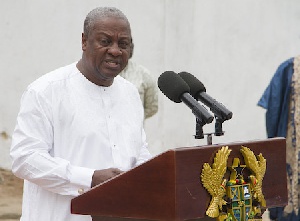President John Dramani Mahama on Tuesday tasked the African Cabinet Government Network to engage primary stakeholders-citizenry in the process of policy making and implementation.
He said: "Policy making and implementation must undergo rigorous and critical process that will benefit all and sundry in your various countries."
President Mahama said this when he addressed the second roundtable meeting of African Cabinet Secretaries on the theme; Transparency and Accountability in policy formation and implementation" in Accra.
The African Cabinet Decision-Making programme was initiated by the Africa Cabinet Government Network to help build the capacity of African governments to make better evidence-informed collective decisions.
The three- year programme is being delivered by Adam Smith International in partnership with the Network and funded by the United Kingdom Department for International Development.
The programme is also providing varying support for approximately 12 African Cabinet Secretariats to improve evidence-informed decision-making, including technical advice and peer support initiatives such as; confidential process reviews, revising cabinet procedures and cabinet liaison networks, among others.
President Mahama said days that policies were made behind closed doors were over, and it was therefore necessary to engage every citizen that would make inputs in shaping such policies.
He said Cabinet secretaries have the task of making evidence-informed decisions for governments to maximally utilize for their transformational projects.
The President said Ghana had formulated far-reaching initiatives under the agenda for transformation that would champion activities in transparency, accountability and human rights policies.
He challenged them to research adequately on the needs of their people and to make inputs that could transform their lives and standards of living.
Dr Ernest Surrur, President of the Council of African Cabinet Secretaries, said the essence of the group was to recognize the potential value in sharing African experiences in governance, and building on the positive and negative lessons from peers.
"One of the things we need to talk about this week is how we take this forward when the UK funding runs out-exploring ways to develop new partnerships."
Dr Surrur said despite all the progress in African governance over the last 50 to 60 years, as Cabinet secretaries, most of their decisions were not implemented in a timely and effective way because proposals lacked evidence.
He, therefore, called for the use of skilled policy analysts in line ministries and Cabinet secretariats to help assess and interpret the policy evidence for effective implementation.
Mr Roger Ansogwine, Ghana's Cabinet Secretary commended the network for the peer review system that would ensure knowledge sharing among them and beyond.
He said such deliberations would be used as focal points in the development and implementation policies that would benefit their governments and others in the network.
General News of Wednesday, 15 April 2015
Source: GNA
Mahama tasks African Cabinet to engage stakeholders
Entertainment












